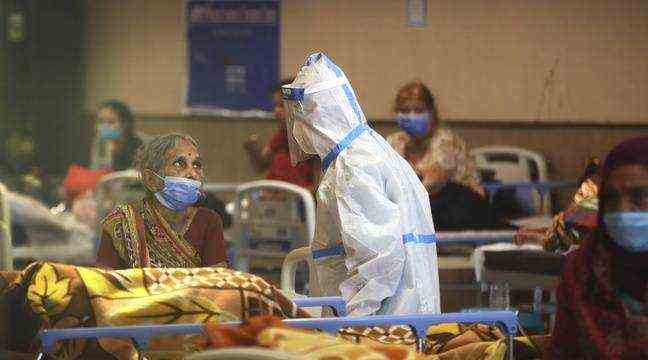The new Indian variant of the Coronavirus worries European countries. – Manish Swarup / AP / SIPA
- While mutations in a virus do not always correlate with its severity, they should be monitored closely to ensure that vaccines remain effective.
- For the moment in Europe, it is the British variant which has established itself and replaced the original virus. It does not seem to give way to the other variants yet.
- If the situation in India is worrying, it is important to remember that the country, very dense, does not have the same sanitary conditions as most countries in Europe.
Described as a “double mutant” and accused of being at the origin of a new wave of contaminations in the subcontinent, the Indian variant of the coronavirus has everything to worry European citizens. The United Kingdom has just banned the entry of travelers from this country, with the exception of its residents. It must be said that the figures are staggering: more than 260,000 people were infected in 24 hours this Sunday in India. If the experts recommend not to take the problem lightly, above all they urge not to panic.
First, it is not said that this variant is sweeping over Europe, because “all viruses do not cross borders”, assures Benjamin Davido, infectious disease doctor at the Raymond-Poincaré hospital in Garches, in the Hauts -de-Seine. For example, the Brazilian variant, which worried so much two weeks ago, has so far not caused a tidal wave in Europe. “We have the British variant which is very established and protects us to a certain extent from the other variants, with which it is in competition,” explains the doctor.
“All viruses mutate”
Then, the fact that a virus is a mutant is not necessarily synonymous with serious danger. “All viruses mutate. For example, the English variant has 19 important variations. And finally, it does not change anything, it is the same virus. There are mutations that don’t change anything, ”comments Catherine Hill, epidemiologist and biostatistician. On the other hand, it is necessary to remain vigilant in the face of these developments.
“The Indian variant has acquired mutations of a second type of virus. It is therefore that it potentially has a recombination capacity, ”explains Benjamin Davido. More familiarly, if the variants marry and have children, this “competition” between the variants mentioned above by the doctor no longer operates, and no version of the virus takes precedence over the other.
Still too little information available
If the experts urge not to fly away with the current wind of panic, it is also because too little information is available at the moment on this brand new variant. “He seems to be particularly contagious, but studies don’t say if his form is more serious than the others,” says Catherine Hill. The concern could arise more from the lack of information on the effectiveness of vaccines against variants.
“Of course, we must monitor, study the variants and verify that the vaccines work well on them but, for the moment, we see that the vaccines protect against them, continues the epidemiologist. There is just the Astrazeneca which has been shown to be a little less effective on the South African variant. The expert also assures us that today we can easily modify RNA vaccines to adapt them to variations in the virus.
Watch for the “risk of immune escape”
The real problem would therefore arise if the Indian variant was resistant to current vaccines. Here again, no study is available for the moment, but the hypothesis should not be ruled out. “It turns out that a lot of people in India who had had the Covid got it again. One of the mutations of the virus therefore seems to resist and may raise fears of a risk of immune escape, details Benjamin Davido. This happens when the antibodies no longer recognize the virus and let it pass. “
In general, this reinfection phenomenon is rare for Covid-19, but becomes problematic if it spreads with the variants, “because this makes us think that the same thing can happen with the vaccine”. The doctor therefore invites you to monitor a possible explosion of re-infections, which would then be a signal of this escape.
“Cut all the taps”
Finally, the experts urge not to superimpose the situation of European countries on others. Like the Brazilian and South African variants, the Indian variant comes from a country where the health situation is less well managed, making it difficult to interpret its severity. “India is a country with different conditions of hygiene and access to healthcare [de celles que nous connaissons en Europe], with a high population density, and a country reputed to be a reservoir of infectious diseases, ”explains the doctor, therefore urging caution.
However, this new mutant reminds us that poor or emerging countries are at risk from the point of view of variants, and that it becomes necessary to be concerned about them in order to “turn off all the taps”. “The WHO needs to adopt an identical global policy and have a plan of action in these countries. We will not achieve this by adopting our own policies, ”recommends Benjamin Davido. For experts, the arrival of new variants should not shift attention to the source of the problem, namely that it is Covid-19 that we catch before a variant. “The fight must therefore continue on the means to bring down contamination”, concludes the doctor.

